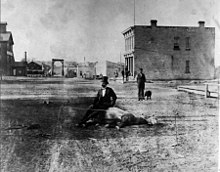Flogging a dead horse


Flogging a dead horse (English for "to hit a dead horse") is an English-speaking expression. It describes behavior in which time or effort is invested in vain in an affair that has already failed or is obviously doomed to fail.
use
The first prominent use of the term is ascribed to the English politician John Bright , who used it to characterize the later British parliamentary reform of 1867 . Bright, one of the most important rhetoricians of his generation and a representative of the radicals , had used it to describe the English reform of the electoral law, which had been bogging down for a long time. In this way he tried to induce the initially little interested members of parliament to become more involved. The reform that was ultimately implemented had a significant impact as it nearly doubled the eligible electorate. In the Oxford English Dictionary , an article from The Globe , a few years later, in 1872, is given as the earliest documented written evidence of the idiom.
Possible predecessors
As early as the 17th century, the expression dead horse stood for a job that was paid for in advance. Work paid for in advance was therefore carried out less carefully or completely, but the client had few sanctioning or motivation options. With ship crews, who were mostly paid in advance for the first month on the boat, there was the tradition of a dead horse celebration after this time.
The beating dead horse was now uncommon before Bright. However, the phrase to slay the slain, which was considered to be somewhat stilted, was known . It can be found in John Dryden's Alexander's Feast and goes back to a quote from Sophocles ' Antigone . “ Nay, allow the claim of the dead; stab not the fall; what prowess is it to slay the slain anew? "(Monologue of Tiresias, German:" Give way to the dead and do not pursue him who is gone. What power is that to kill the dead? ")
Citing Slay the Slain was seen as a sign of education and an expression of a sophisticated literary style. This can be found, among other things, in the ridiculous poem Monkeyana in Punch, published as part of the hippocampus debate . The background was a public debate in May 1861 and further disputes over Charles Darwin's Origin of Species and its defense by Thomas Henry Huxley .
Bright's quote summarizes two different expressions from different language levels in one memorable image. Olivia Isil's book on marine idioms in everyday English takes this into the title.
"When a Loose Cannon Flogs a Dead Horse There's the Devil to Pay: Seafaring Words in Everyday Speech"
"When a walking powder keg beats a dead horse, the big end comes at the end - maritime expressions in everyday language"
Other uses
The Israeli science historian Joseph Agassi wrote an essay under the title
"On the Merit of Flogging Dead Horses"
"Why it pays to beat dead horses"
In scientific work he advocates re-examining theories that have once been thoroughly refuted. This cannot be avoided in scientific work.
There are, among other things, some music albums that allude to the phrase. Flogging a Dead Horse from the Sex Pistols put together a few successful singles after the band split up in 1980. Beating Dead Horses comes from the industrial metal band 16Volt, Beating a Dead Horse to Death… Again is an album released in 2008 by Dog Fashion Disco.
The title of the book can be found in the biography and work overview of the artist brothers Jake and Dinos Chapman . The two provocateurs had bought original watercolors by Adolf Hitler, among other things, and provided them with smileys and sunflowers under the title If Hitler Had Been a Hippy How Happy Would We Be .
Web links
- Sensational Etymologies . TakeOurWord.com
- "Beating A Dead Horse". GoEnglish.com
Individual evidence
- ^ The Globe. August 1, 1872.
- ↑ Nicker Nicked in Harl. Misc. (Park) II. 110 (1668).
- ^ Alfred Simmons: Old England and New Zealand. London 1879, p. 113.
- ↑ Antigone: Tiresias' Monologue, translation after Hölderlin, Antigonae / Fourth Act . Monologue Archive. Retrieved September 21, 2013.
- ↑ “Monkeyana”, “Punch”, May 1861 . The Huxley File. Retrieved September 21, 2013.
- ↑ Olivia A. Isil: When a Loose Cannon Flogs a Dead Horse There's the Devil to Pay: Seafaring Words in Everyday Speech . International Marine, 1996, ISBN 0-07-032877-3 .
- ^ Joseph Agassi: Fourth preliminary essay: On the merit of flogging dead horses . In: Science and Its History. A Reassessment of the Historiography of Science . Springer, 2008, ISBN 978-1-4020-5632-1 .
- ↑ Jake and Dinos Chapman (eds.): Flogging a Dead Horse: The Life and Works of Jake & Dinos Chapman. Rizzoli International Publications, New York 2011, ISBN 978-0-8478-3478-5 .
- ↑ Mark Brown: Hitler gets Chapman treatment as Hell rises from the ashes. In: The Guardian. May 30, 2008.